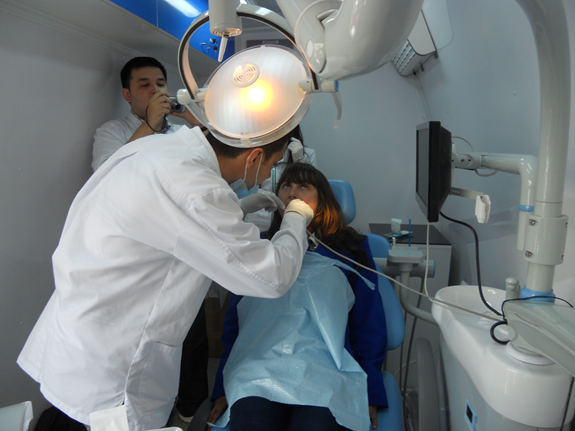Residents of isolated villages around the border between Romania and Bulgaria now have access to dental services, often for the first time in their lives. A mobile care van from the SAN-CAR project provides free consultations and treatment to 14 isolated villages without dental medical services, improving inhabitants’ health and quality of life.
- 14 April 2016
The project provided real social benefits for rural communities by improving access to medical services. The Mobile Dental Clinic improved the oro-dental health of people from isolated rural areas and increased their quality of life.
So far, the project’s mobile dental clinic has given free consultations and treatment to 10 107 people who have no local dentist, in the Romanian counties of Constanta and Calarasi and Dobrich District in Bulgaria. SAN-CAR has also provided practical training for eight student dentists, who assisted the experienced healthcare professionals in charge of the treatment.
Closing the healthcare gap
Many rural communities in Romania and Bulgaria still live far from the services the countries’ urban citizens take for granted. One such service is dental healthcare, impacting people’s quality of life and their wider health status. Travel to the nearest dental clinic is often prohibitively expensive or takes too long – so SAN-CAR has brought dental services to the people.
Led by the faculty of dentistry at Constanta’s Ovidius University, the project has fitted out a large van as a fully-equipped dental clinic that can visit isolated communities. Following a schedule drawn up with local authorities, teaching staff from the faculty – all qualified dentists – have travelled around the region to hold dental clinics, assisted by final-year dentistry students.
As well as improving the health of rural communities, SAN-CAR aims to reduce disparities between the quality of medical services between urban areas and rural areas, boosting rural development and enhancing social inclusion.
Cross-border cooperation
Local authorities and healthcare professionals in both countries have been closely involved in the project. While local coordinators – along with healthcare and local authority representatives – have accompanied the van on its rounds in the region, the project has also improved cross-border cooperation on health matters.
Romanian and Bulgarian authorities have worked together to support the mobile clinic, and exchanged know-how and best practices in training doctors. They have also developed a joint structure for cooperating on healthcare services throughout the cross-border region.
As a result of the project, the cross-border area’s existing dental health network – ROBUDENT – has expanded to include 16 new members, including Romanian and Bulgarian dental practices. SAN-CAR has also established an operational cross-border unit for the region’s Cross-border Centre of Oro-dental Research, which has organised professional training for the network’s doctors, recognised by their professional bodies.
Although SAN-CAR ended in 2011, the mobile dental clinic continues to serve the area, with visits timetabled to include the latest group of final-year dental students. Four new jobs were created for the mobile dental clinic.
“The project is capitalising on the results of ROBUDENT, which was financed by Phare (The pre-accession assistance programme)” says Dr Cerneliu Amariei, Dean of the Dental Medicine College in Constanta, Romania. “The good cooperation with the Bulgarian partners established then has been the basis of the success of the present project.”
Total investment and EU funding
Total investment for the project “Caravan of the Health and Education” is EUR 284 152, with the EU’s European Regional Development Fund contributing EUR 210 482 through the “Romania - Bulgaria Cross Border Cooperation Programme” Operational Programme for the 2007-2013 programming period. The programme aims to increase economic and development and social cohesion, and strengthen social and cultural coherence and cooperation among communities in the areas covered.

